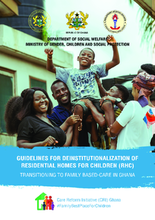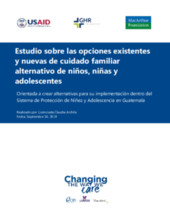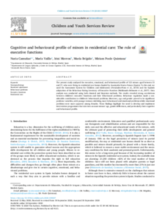Displaying 181 - 190 of 1466
This publication presents the latest figures on children and young people in care in Northern Ireland.
This document is aimed at complementing the Standard Operating Procedures (SOPs) for Licensing, Monitoring and Closure of Residential Homes for Children (RHC) by supporting the implementation of the closure of RHCs that have not been licensed or do not meet the standards in the SOPs.
Este informe de Changing the Way We Care revisa las opciones existentes de cuidado familiar alternativo en Guatemala y ofrece recomendaciones para otras modalidades y prácticas.
Comprised of videos and accompanying discussion guides, this video series features the learning from practitioners working across a range of care-related programs and practices in Kenya.
In this video, Peter Kamau from Child in Family Focus discusses his organisation’s approach to engaging with the directors of privately-run charitable children’s institutions (CCI’s) to secure their buy-in for transition and the reintegration of children into families, in line with government policy.
The present study analysed the executive, emotional, and behavioural profile of 121 minors aged between 13 and 17, who were living in residential care homes funded by Asociación Nuevo Futuro (Spain).
The purpose of this study was to enhance understanding of restrictive interventions in residential units as a means of improving professional practices involving children and youth in out-of-home care.
The aim of this study was to explore the experiences and impact of the pandemic and the resulting social isolation on the wellbeing and protection of children living in a residential care facility.
The goal of the present study was to better understand the scope and characteristics of rapid return, and to provide data-informed recommendations for service providers working with this population.
This chapter provides an overview of one of the key factors implicated in young people’s contact with the criminal justice system: the criminalisation of children with care experience.






